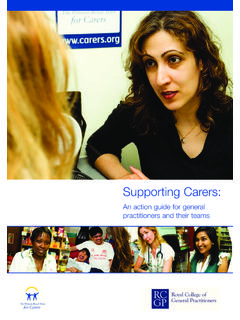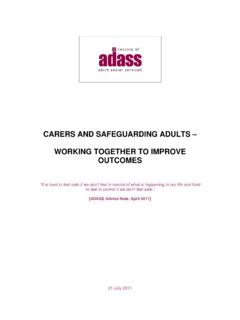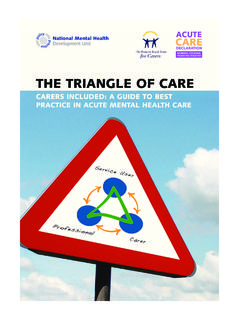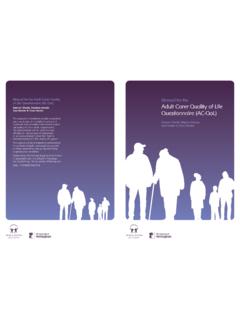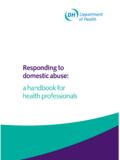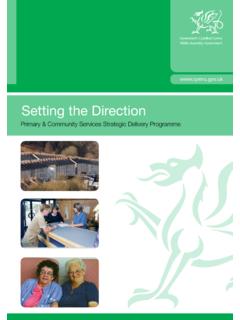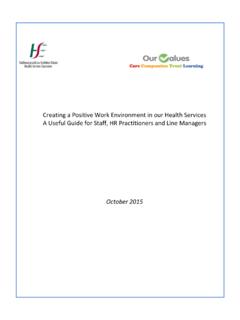Transcription of Manual for Measures of Caring Activities and Outcomes
1 Manual for Measures of Caring Activities and Outcomes For Children and Young People Stephen Joseph, Fiona Becker, Saul Becker Manual for Measures of Caring Activities and Outcomes For Children and Young People 2nd Edition Stephen Joseph, Fiona Becker, Saul Becker First published in Great Britain in March 2009 by Carers Trust in association with Young Carers International Research and Evaluation, School of Sociology and Social Policy, The University of Nottingham, University Park, Nottingham NG7 2RD. Updated 2nd edition in April 2012 by Carers Trust, 32 36 Loman Street, London, SE1 0EH. Stephen Joseph, Fiona Becker and Saul Becker A catalogue record for this Manual is available from the British Library. ISBN 13 9780853582533. Stephen Joseph is Professor of Psychology, Health and Social Care and Director, Centre for Trauma, Resilience and Growth, The University of Nottingham. Fiona Becker is a Senior Consultant, NSPCC.
2 Saul Becker is Professor of Social Policy and Social Care and Head of the School of Sociology and Social Policy, The University of Nottingham. The right of Stephen Joseph, Fiona Becker and Saul Becker to be identified as authors of this work has been asserted by them in accordance with the 1988 Copyright, Designs and Patents Act. All rights reserved: no part of this publication may be reproduced, stored in a retrieval system, or transmitted in any form or by any means, electronic, mechanical, photocopying, recording, or otherwise as part of research projects or surveys without specific written permission from the authors. The instruments in the Manual may be photocopied and used by practitioners within their own organisation for individual assessment and clinical use. Photocopies may not be made for distribution to other organisations. All other copyright restrictions remain in force. The statements and opinions contained within this publication are solely those of the authors and not of Carers Trust.
3 Acknowledgements The authors acknowledge with gratitude the help of the young carers projects that piloted the outcome instruments. Thanks to Steve Regel and Roda Madziva at The University of Nottingham. The advice and guidance from Alex Fox previously of The Princess Royal Trust for Carers (now Carers Trust) was also greatly appreciated. Funding The development of the outcome instruments and publication of the Manual was funded in 2009. by Comic Relief in association with The Princess Royal Trust for Carers (now Carers Trust). Competing interests No financial or competing interests have been declared by the authors. Download This Manual can be downloaded for free from: and Citation This Manual should be cited as: Joseph, S., Becker, F. and Becker, S. (2012) Manual for Measures of Caring Activities and Outcomes for Children and Young People (2nd edition). London: Carers Trust. Design and production by Touch Design: Contents page 1.
4 Context for the development of the Measures Introduction 01. recognising the needs of young carers 01. Growth in services for young carers 02. Need for robust Measures 02. A note for users 03. About me and my family 04. 2. Measures of Caring activity and Caring Outcomes Introduction to the Measures 04. Development of the Measures 05. Multidimensional Assessment of Caring Activities (MACA-YC18) 06. Positive and Negative Outcomes of Caring (PANOC-YC20) 10. 3. Additional resources Introduction 13. Multidimensional Assessment of Caring Activities (MACA-YC42 ) 13. What I Like and Dislike About Caring 16. Post Intervention Self Assessment PISA-CT2012 19. 4. References 23. i 1. Context for t he development of t he Measures Introduction This Manual is intended to provide researchers and practitioners in the field of Caring with relevant and accessible instruments for the assessment of Caring Activities and Caring Outcomes in children and young people.
5 The instruments can be used on a one-off basis for the purpose of assessment, or pre- and post-intervention to measure change and the impact of support. If used pre- and post-intervention, then practitioners working with young carers will be able to inform their funders and other partners about whether or not their work has made a measurable difference. The instruments can measure the extent and nature of Caring and its impact on the emotional and social well-being of a young person. recognising the needs of young carers Many children and young people are involved in Caring for parents, siblings, or other relatives who have an illness, disability, mental health condition or other need for care or supervision (Aldridge and Becker, 2003; Becker, 2008; Becker and Becker, 2008a and 2008b; Dearden and Becker, 2000, 2004). These young carers' are defined as children and young persons under 18 who provide or intend to provide care, assistance or support to another family member.
6 They carry out, often on a regular basis, significant or substantial Caring tasks and assume a level of responsibility that would usually be associated with an adult. The person receiving care is often a parent but can be a sibling, grandparent or other relative who is disabled, has a chronic illness, mental health problem or other condition connected with a need for care, support or supervision (Becker, 2000, p 378). There is growing recognition of young carers amongst governments in the UK and overseas as well as policy makers and practitioners working in health, social care and education (Becker, 2007). These different professional domains have recognised that children with Caring responsibilities are also their concern whether they be in the classroom, attending their GP. or living in a family receiving health and social care interventions. Two central government strategies (HM Government, 2008; HM Government 2010) have also highlighted the needs of young carers and what should be done to support them.
7 01. 1. Context for the development of the Measures Growth in services for young carers From just a handful of dedicated young carers projects in the early 1990s there are now over 350 projects/services across the UK in contact with around 30,000 young carers (Becker, 2008). This growth in awareness and identification of young carers and in the number of specialist young carers services and projects was triggered and has been maintained by three key factors: first, a growing research literature on young carers and their families;. second, the work of charitable organisations that helped to promote public, political and professional awareness, and finally, changes in legislation1, guidance and policy initiatives (Department of Health, 1999; HM Government, 2008) which have placed greater emphasis on the need for services to assess and support young carers in order to improve their welfare, health, education and general well-being.
8 Census data in 2001 (Office for National Statistics, 2003) revealed that there were 175,000 young carers (aged 0-18) in the UK, which is of all children. Although this figure was higher than expected it is likely to be an under representation since many families will not identify that they have a young carer in their household, rather Caring is seen as a normal' or routine part of their everyday experiences and relationships; or families might not wish to disclose that they have a child Caring , especially where there is parental mental illness, substance misuse or other stigmatising conditions such as HIV and AIDS (Aldridge and Becker, 2003; Evans and Becker, 2009). In 2010 the BBC surveyed more than 4000 UK school pupils using the MACA from this Manual and found 1 in 12 had moderate or high levels of Caring responsibility. For the UK this would equate to 700,000 young carers, more than four times the 2001 census figure.
9 Need for robust Measures There has been limited research into the Outcomes produced by support services for young carers. Given the significant investment of governmental and charitable resources, and health and social care services for young carers, it is critical that service providers, including the 350. young carers projects in the UK, have robust Measures which can be used in this context. Indeed funding organisations are increasingly demanding robust evidence on Outcomes . The 2008 national carers strategy (HM Government, 2008) recognised that a detailed evaluation of the different approaches and their impact on young carers and their Outcomes is lacking (HM Government, 2008, p 131). The more recent shift to an Outcomes -based approach to commissioning and procurement also highlights the need for robust Measures that focus on Outcomes for all children and young people. 1 The Carers (Recognition and Services) Act 1995 gives carers of any age the right to an assessment of their ability to provide and to continue to provide care'; The Carers and Disabled Children Act 2000 gives family carers over the age of 16 a right to request an assessment of their own needs and to receive services and support, even if the cared for person does not wish to have an assessment; The Carers (Equal Opportunities) Act 2004 requires local authorities to inform carers of their rights to an assessment in certain circumstances and to consider whether the carer works, undertakes education or training, leisure Activities or wishes to do any of these things (see Frank and McLarnon, 2008, for a fuller description of the legal entitlements of young carers).
10 02. 1. Context for the development of the Measures Furthermore, while many countries in the world are now recognising and responding to the needs of young carers few have developed systematic responses including a network of dedicated support projects as in the UK. Research has shown (Becker, 2007) that the experiences and needs of young carers in developed countries such as the UK, Australia and the USA are very similar. The instruments in this Manual will consequently be useable in these countries. Professionals working with young carers outside of specialist young carers projects could also utilise the instruments as they would generate useful information both for assessment and evaluation purposes. Some young carers services have sought to use generic outcome Measures or Measures that have been developed for other groups of young people. However, the results generated by the use of non-specific Measures may not be reliable when applied to work with young carers.
